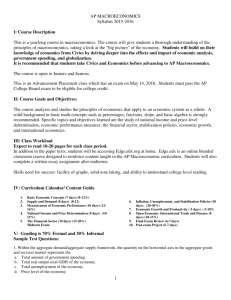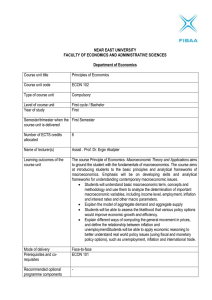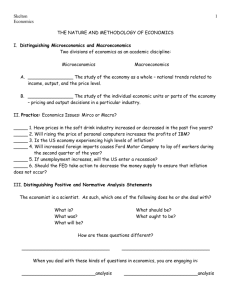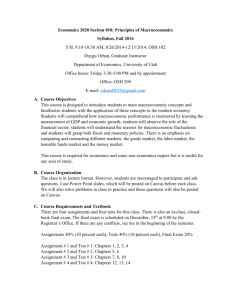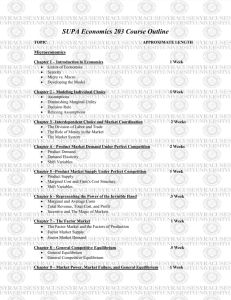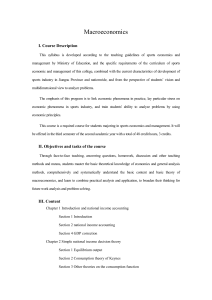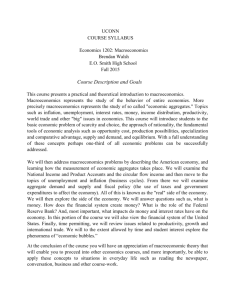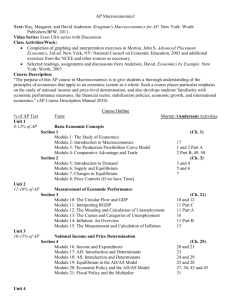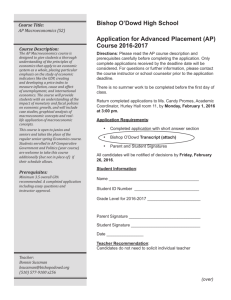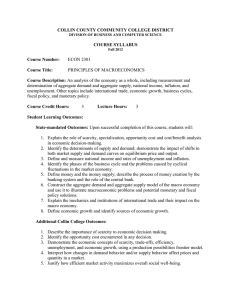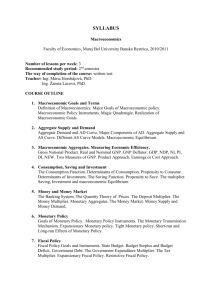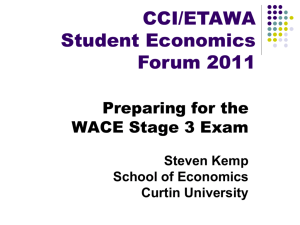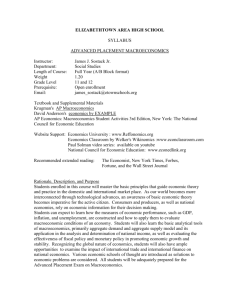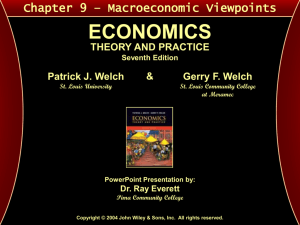Course: Principles of Macroeconomics (ONLINE)
advertisement
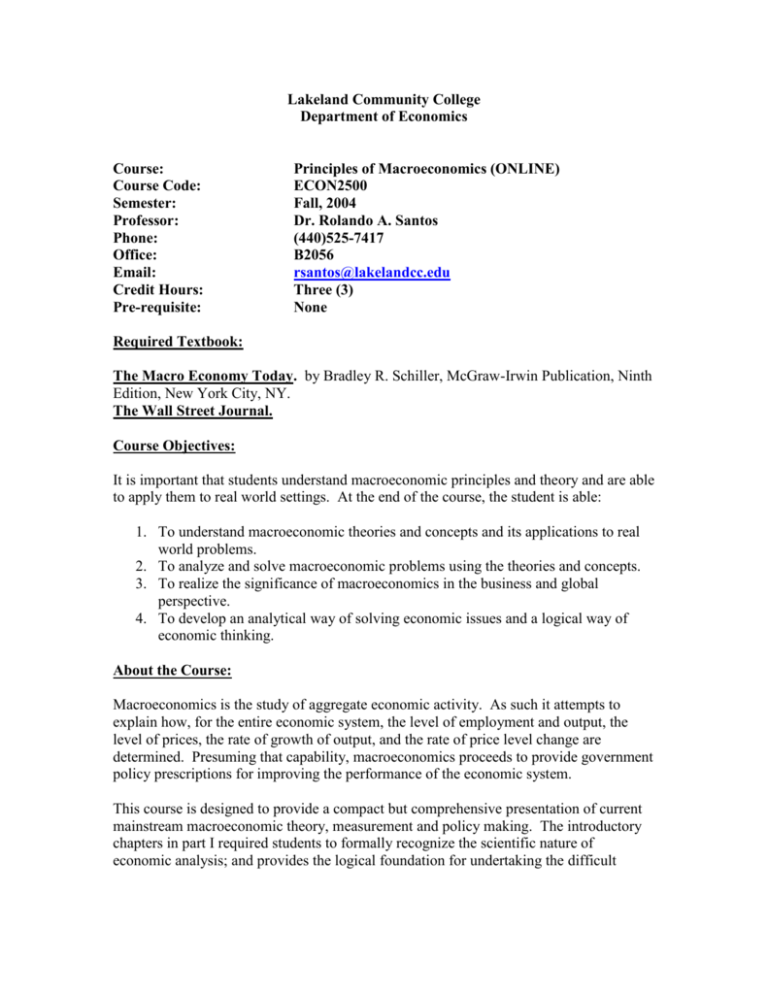
Lakeland Community College Department of Economics Course: Course Code: Semester: Professor: Phone: Office: Email: Credit Hours: Pre-requisite: Principles of Macroeconomics (ONLINE) ECON2500 Fall, 2004 Dr. Rolando A. Santos (440)525-7417 B2056 rsantos@lakelandcc.edu Three (3) None Required Textbook: The Macro Economy Today. by Bradley R. Schiller, McGraw-Irwin Publication, Ninth Edition, New York City, NY. The Wall Street Journal. Course Objectives: It is important that students understand macroeconomic principles and theory and are able to apply them to real world settings. At the end of the course, the student is able: 1. To understand macroeconomic theories and concepts and its applications to real world problems. 2. To analyze and solve macroeconomic problems using the theories and concepts. 3. To realize the significance of macroeconomics in the business and global perspective. 4. To develop an analytical way of solving economic issues and a logical way of economic thinking. About the Course: Macroeconomics is the study of aggregate economic activity. As such it attempts to explain how, for the entire economic system, the level of employment and output, the level of prices, the rate of growth of output, and the rate of price level change are determined. Presuming that capability, macroeconomics proceeds to provide government policy prescriptions for improving the performance of the economic system. This course is designed to provide a compact but comprehensive presentation of current mainstream macroeconomic theory, measurement and policy making. The introductory chapters in part I required students to formally recognize the scientific nature of economic analysis; and provides the logical foundation for undertaking the difficult analytical task of constructing models of macroeconomy by discussing the goals of macroeconomic policy. To the Student Many students find economics a difficult subject because, unlike many other courses a college student takes, economics cannot be mastered through memorization. Economics relies on economic theories to explain real world occurrences. An economic theory is simply a logical explanation of why the facts fit together in a particular way. The successful student will be the one who learns that economics is built upon a number of fairly simple and easy-to-understand propositions – these propositions are typically little more than common sense and should not intimidate a student. Another factor that can make economics difficult is that like other disciplines-economics has its own specific vocabulary, many of which may already be familiar to you. Economists, however, use the vocabulary of economics in a very exact way, and often the common usage of a term is not the same as the economic usage. Academic Honesty The Academic Honesty Code of Lakeland Community College will be strictly enforced. In accordance with the university policy, any attempt to cheat on quizzes or exams will be result in an automatic “F” in the course and a report will be forwarded to the Dean. Class Attendance and Participation: You are expected to attend class consistently, do the assigned homework and participate in class. Class attendance is extremely important and low grades are often associated with those who choose not to attend. Please bring your book, calculator and a pencil to every class. Grading: Class Standing------------------------------------------------ 10% Quizzes-------------------------------------------------------- 10% Midterm Exam----------------------------------------------- 40% Final Exam---------------------------------------------------- 40% Total 100% *Note: Class standing includes forum discussions. The exam will consist of definitions from the back of the chapters (key terms), problem solving and essay type questions. Most questions will be designed to test your reasoning and logical explanation. You should also expect some applied questions on the exams. Illustrations of such questions will be provided during the lecture hour. Students are expected to take all exams and submit their assignments on time. Failure to do so will result in a “F” on any exam not taken or assignments not submitted. There will be no make-up exam. (Exception: a make up exam will be given only in case of medical emergency, however, it is left to the student to provide sufficient evidence of that extent. The student is also expected to inform the professor in advance of his reasons for not taking the exam). There will be no make up quizzes regardless of the reason. All questions on the exam will be from the material covered in the class, the chapters assigned and the syllabus. Grading Scale: A = B = C = D = F = 90-100% 80-89% 70-79% 60-69% below 60% COURSE OUTLINE Course Orientation: August 31,2004, 5-6 pm, C3079 1. Introduction (Chapter 1-2) Date: 8/30-9/3; 9/7-9/10 a. Methodology and a Global View b. Nature of Economic Choice c. Production Possibility Curve d. Circular Flow of Economic Activity 2. Theory of Demand and Supply (Chapter 3) Date: 9/13-9/17 a. Reading and Working with Graphs b. Law of Demand and Supply c. Market Equilibrium d. Dynamics of Demand and Supply 3. National Income Accounting (Chapter 5) Date: 9/20-9/24 a. Measures of output b. Importance of macroeconomic measurement c. Expenditure vs income approach d. Measuring the price level e. GDP and social welfare. 4. Inflation (Chapter 7) Date: 9/27-10/1 a. What is inflation? b. c. d. e. Measuring inflation Consequences of inflation Cost-push vs demand-pull inflation Hyperinflation vs stagflation 5. Unemployment (Chapter 6) Date: 10/4-10/8 a. Types of unemployment b. Macroconsequences of unemployment c. Natural Rate of Unemployment d. Measuring Unemployment 6. The Inflation-Unemployment Relationship (Chapter 16, 19) Date: 10/11-10/15 a. The Phillip’s curve b. Stagflation c. The natural rate hypotheses d. Policy Implications Mid-Term Exam: October 18-22, 2004 7. Business Cycle (Chapter 8) Date: 10/25-10/29 a. Historical Cycles b. Phases of the cycles c. Noncyclical fluctuations d. Real Business Cycles e. Implications 8. Aggregate Spending (Chapter 9,10) Date: 11/1-11/5 a. Aggregate supply vs aggregate demand b. Macro equilibrium c. Theory of Consumption d. Theory Savings e. Leakage from the circular flow f. Theory of investments 9. Equilibrium National Output in the Keynesian Model (Chapter 10) Date: 11/111/5 a. Total spending at full employment b. Expenditure-output approach c. Inflationary vs recessionary gap d. The multiplier effect e. Equilibrium income 10. Fiscal Policy (Chapter 11,12) Date: 11/8-11/12 a. The nature of fiscal policy b. Discretionary vs automatic stabilizers c. d. e. f. g. Alternatives to government spending Tax and government multipliers Public debts, Crowding Out effect Economic implications Ricardian Equivalence 11. Money and Banking (Chapter 13) Date: 11/15-11/19 a. The functions of money b. Demand and supply of money c. Creation of Money d. The banking system: multiple-deposit expansion 12. Federal Reserve System (Chapter 14) Date: 11/22-11/24 a. Structure of the Federal Reserve b. Instruments/Tools of Monetary Policy c. Monetary Policy, equilibrium GDP and price level d. Effectiveness of monetary policy 13. International Trade (Chapter 18, 20) Date: 11/29-12/3 a. Importance of world trade b. Economic basis of trade c. Specialization and comparative advantage d. Tariffs 14. Exchange Rates and Balance of Payments (Chapter 21) Date: 12/6-12/10 a. Financing International Trade b. Balance of Payments c. Foreign Exchange Markets d. Flexible vs Fixed Exchange Rates e. Causes of Trade Deficits. Final Examination: 12/13-12/15 Other References: Arnold, Roger, Macroeconomics. 4th edition. Southwestern Publishing, Cincinnati, OH 1998. Baumol , William and Blinder, Alan S. Economics: Principles and Policy. 5th edition, San Diego:Harcourt Brace Jovanovich, 1991. Dolan, Edwin C., and Lindsey, David E. Economics. 5th edition. Chicago: The Dryden Press, 1990. McConnell, Campbell R., and Stanley Brice. Economics. 12th edition. McGraw Hill Inc., 1997. Statistical Resources: Economic Report of the President. Supt. Of Documents, US Government Print, Washington, DC. Frumkin, Norman. Guide to Economic Indicators. Third Edition. ME Sharpe, London, England. 2000. The Economist. The Economist Newspaper Ltd., Boulder, CO. Far Eastern Economic Review. Dow Jones Company, New Jersey, USA World Development Report. The World Bank, 1998-99 Oxford University Press. Statistical Abstract of the US. US Department of Commerce. Washington, DC 1949present. Note: This syllabus is subject to revision due to extenuating circumstances or to maintain academic standards. Notice of any changes will be provided to you in written form.
